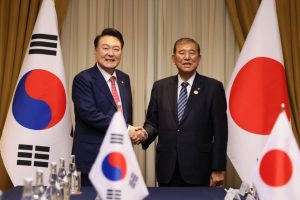The year 2025 marks the 60th anniversary of the normalization of diplomatic relations between Japan and South Korea, a significant milestone in the history of both nations. Despite the long-standing tensions and complex history between the two countries, this anniversary provides a significant opportunity to reflect on the progress made and to reaffirm the potential for future collaboration. Under the leadership of Japanese Prime Minister Ishiba Shigeru and South Korean President Yoon Suk-yeol, there is hope that this momentum will continue, with both countries taking steps to address shared challenges and enhance bilateral cooperation.
In recent years, the strategic importance of Japan-South Korea relations has become more pronounced, especially in the face of evolving threats from North Korea and growing geopolitical shifts in the region. During a meeting in Peru on November 16, Ishiba and Yoon agreed on the importance of cooperation between Japan, South Korea, and the United States in addressing North Korea’s nuclear and missile developments and its increasing military ties with Russia. Ishiba and Yoon were also joined by U.S. President Joe Biden for a trilateral summit on November 15. This alignment on regional security issues is a clear indication that both Japan and South Korea recognize the necessity of working together to ensure peace and stability in Northeast Asia.
Also, in anticipation of the 60th anniversary, the Japanese Ministry of Foreign Affairs established a special office in August 2024 to manage the commemoration and strengthen bilateral ties. The upcoming events in 2025, including the Osaka-Kansai Expo and the APEC CEO Summit in Gyeongju, offer tangible platforms to celebrate the successes of the past six decades and to set the stage for deeper cooperation in the future.
As we approach the 60th anniversary, however, there have already been some bumps on the road. For example, Japan-South Korea relations recently became a hot topic once again over the issue of visits to Yasukuni Shrine. On November 24, the Korean side – both bereaved family members and government participants – canceled their participation at the last minute in a memorial ceremony held in Niigata Prefecture for the gold mine workers on Sado Island. The South Korean side claimed that Parliamentary Vice Minister for Foreign Affairs Ikuina Akiko, who participated in the ceremony, had visited Yasukuni Shrine on August 15, 2022 – the anniversary of the end of World War II – after her election to the House of Councilors in July that same year. This was seen as the reason for the Korean side’s absence. The Japanese government, on the other hand, maintains that there is no evidence Ikuina has visited Yasukuni Shrine since her election.
Ishiba has also faced criticism from South Korea over the controversial Yasukuni Shrine issue. He is regarded as a pro-Korea figure, and the Korean side hoped for improving Japan-South Korea relations after his inauguration. The Korean Times reported this September that Ishiba had expressed somewhat critical views regarding visits to Yasukuni Shrine. However, in October, Ishiba sent an offering to the shrine, prompting South Korea’s Ministry of Foreign Affairs to express deep disappointment and regret. While it is said Ishiba’s actions align with precedents set by former leaders such as Suga Yoshihide and Kishida Fumio, his offering to Yasukuni Shrine has been perceived as an attempt to maintain the support of Japan’s conservative base, despite his reputation as a pro-Korea politician.
Although Ishiba’s image as a figure of reconciliation is welcomed, actions like this risk undermining trust in his commitment to fostering better ties with South Korea. His apparent balancing act – catering to conservative factions while presenting himself as a reformer – can erode his credibility, particularly in South Korea. To ensure lasting progress in Japan-South Korea relations, consistent and clear actions are vital, as wavering decisions like the recent Yasukuni offering may only deepen skepticism across the region.
On the one hand, Ishiba’s administration notably includes Foreign Minister Iwaya Tsuyoshi, who has demonstrated a firm commitment to improving Japan-South Korea relations despite political tensions. He served as Japan’s defense minister during the radar-locking incident in 2018 involving a South Korean naval vessel and a Japanese patrol plane, and Iwaya advocated for forward-looking bilateral relations even amid the controversy. In 2019, he emphasized the importance of future-oriented Japan-South Korea defense cooperation, stating that mutual trust was fundamental to the relationship. Even today, despite facing criticism from within the Liberal Democratic Party for his pro-engagement stance, Iwaya stated that “Japanese diplomacy would not be possible if we were averse to China and Korea” at a press conference on November 2.
This steadfast commitment to dialogue and reconciliation is particularly meaningful as Japan and South Korea prepare to commemorate significant anniversaries in their bilateral relationship next year. Iwaya’s approach reflects a constructive vision for the future, one that prioritizes mutual understanding and collaboration over divisive rhetoric. Despite the challenges, this stance offers a promising foundation for improving Japan-South Korea relations, and it deserves recognition and support.
The 60th anniversary of Japan-South Korea relations presents both a moment of reflection and a chance for progress. While there are undeniable challenges, particularly surrounding historical issues, both nations have an opportunity to build on the momentum of the past few years. Ishiba’s vision for a more cooperative and forward-looking relationship is commendable, but it must be accompanied by actions that match this rhetoric. To ensure a lasting and positive future for Japan-South Korea relations, both governments must demonstrate sincerity, consistency, and a shared commitment to overcoming the legacies of the past in favor of a more harmonious and prosperous future.
































